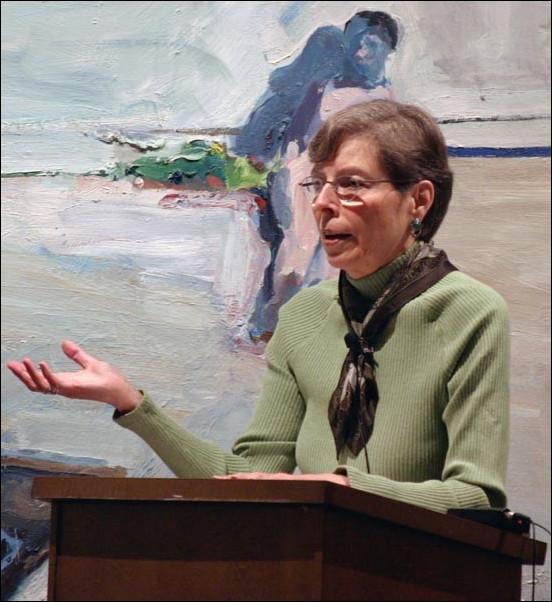Author receives faculty award
Image: Author receives faculty award:Ann Weldy speaks about her experience writing pulp fiction in the library. Angel Lopez/State Hornet:
April 20, 2005
From the late 1950s to the early 1960s, pulp novel author Ann Bannon emerged as one of the leading writers of lesbian fiction with her five-book series, &The Beebo Brinker Chronicles.&
Offering a view into the world of lesbian life and homophobia in the 1950s, the books connected with readers of generations young and old, thanks to the series& popularity and reprints over the years.
However, while the &Beebo Brinker Chronicles& continued to find new readers in the decades following its release, Bannon had already moved on with her life. Graduating from Sacramento State in 1968 with a master&s degree, she returned to Sac State in 1974 after receiving her doctorate in linguistics at Stanford University.
By the time she entered Sac State, however, she had stopped using the name &Bannon,& which was just a pen name she adopted to conceal her identity. Her real name is Ann Weldy, and for her contribution to her alma mater, she became the 2005 recipient of the Sac State Alumni Association&s Distinguished Faculty Award.
Her story began in the early 1950s as a recent college graduate and newly married woman; while her husband went to work, she stayed at home. Weldy wanted something more and turned to an old Remington typewriter she owned. She wanted to write a novel. However, she didn&t know what to write about.
For inspiration, Weldy turned to the &pulp& paperback books commonly found at the drugstores and bus stations of the time. They were called &pulp& books because of the cheap paper used for printing them, and they were often shunned by critics as being low-brow and raunchy.
&Women&s Barracks,& the first lesbian pulp novel published in 1950, and Marijane Meaker&s &Spring Fire& were the books that Weldy drew inspiration from to write her novel.
&&Women&s Barracks& ran through printing after printing; it made a stunning impression on.& Gold Medal Books, and they quickly realized they had found the pot of golden lesbian at the end of the rainbow,& Weldy said.
Weldy&s first attempt at her novel ran more than 600 pages, but it was based mostly on what she had read about lesbian encounters and not on her own experience. She contacted Meaker for advice, and Meaker invited her to New York in 1955 so she could conduct her own &field research,& as Weldy called it, by visiting Greenwich Village and all the women&s bars.
Meaker also introduced her to the editor-in-chief at Gold Medal, a major publisher of pulp books at the time, to look at Weldy&s novel.
&(The editor-in-chief) said, ominously, &This is a pretty bad book, but& & basically he said, &Take it home, cut it in half and tell the story of the two young sorority sisters,& & Weldy said.
She did just that, and the second version of her novel became &Odd Girl Out,& the first of the five books in the &Beebo Brinker Chronicles.&
The book went on to sell half a million copies and was the second-best-selling paperback of 1957.
Weldy&s last book in the series, &Beebo Brinker,& was released in 1962.
&If the ghosts of readers yet-to-come had wafted out of my typewriter keyboard and said, &You will be traveling the world, lecturing on your books half a century from now,& & I would have been terrified. But I look back and I think it was probably a good thing I had no idea,& Weldy said.
All five of the books in her &Beebo Brinker Chronicles& are currently available as reprints from Cleis Press. Fans of Weldy can look forward to the release of her newest work, a memoir of her life during her years as a pulp book writer.













































































































































